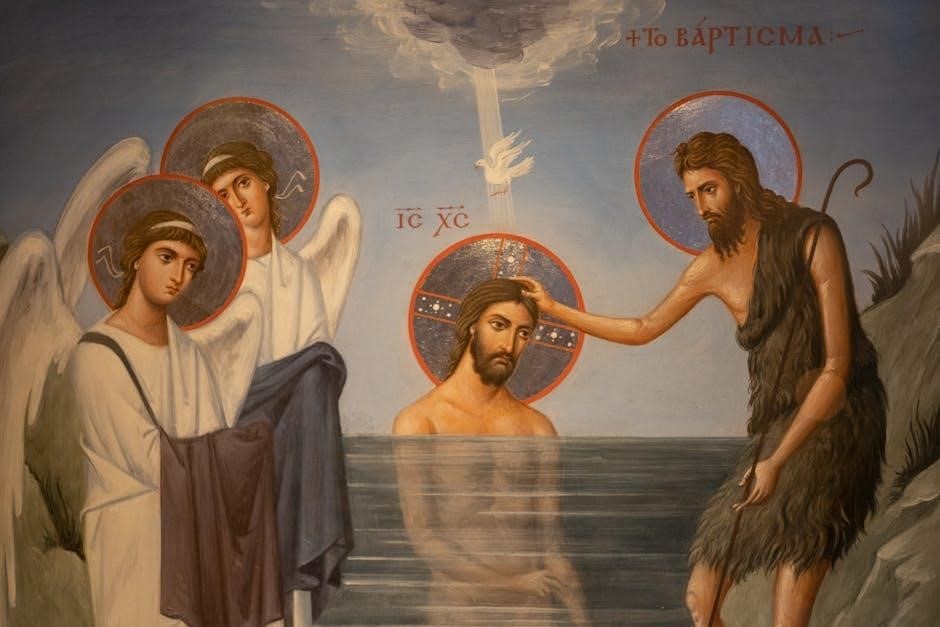John Calvin’s Institutes of the Christian Religion is a foundational theological work‚ first published in 1536‚ systematically presenting Christian doctrine and Reformed theology. Available in PDF and other formats‚ it remains a cornerstone of Protestant thought‚ offering insights into God‚ humanity‚ and salvation through Christ.
John Calvin to the Reader‚ 1559
In the 1559 edition of the Institutes of the Christian Religion‚ John Calvin addressed the reader directly‚ providing a preface that serves as both an introduction and a dedication. This letter outlines the purpose of the work‚ emphasizing its systematic approach to Christian theology and its goal of aiding believers in understanding the doctrine of salvation. Calvin humbly presents his work as a tool for spiritual growth‚ encouraging readers to study the text diligently. The preface also highlights Calvin’s desire to provide clarity and depth in explaining the teachings of Scripture‚ making it accessible to both scholars and laypeople. This preface is included in modern PDF editions of the Institutes‚ preserving its historical and theological significance.
Subject Matter of the Present Work

The Institutes of the Christian Religion is a comprehensive theological work structured to explore the fundamental doctrines of Christianity. Its subject matter revolves around the knowledge of God‚ humanity’s relationship with God‚ and the means of salvation through Christ. The work is divided into four main books‚ each addressing distinct themes: the knowledge of God the Creator‚ the knowledge of God the Redeemer‚ the way of salvation‚ and the external means by which God invites us into fellowship with Christ. This systematic approach provides a thorough understanding of Reformed theology‚ making it a cornerstone of Protestant thought and study.
Prefatory Address to King Francis I of France
The preface of the Institutes is a dedicatory address by John Calvin to King Francis I of France‚ written to appeal for religious tolerance and to present the work as a confession of faith. Calvin sought to distinguish Protestant beliefs from heresy‚ emphasizing the continuity of Reformed theology with the teachings of the early church. This strategic dedication aimed to gain support for the Reformation in France and to clarify the principles of Protestantism. The address underscores the Institutes’ purpose as a systematic exposition of Christian doctrine‚ structured to aid those seeking instruction in the doctrine of salvation. It remains a pivotal part of the work‚ highlighting its theological and historical significance.

Historical Background and Importance
Published in 1536‚ the Institutes is a cornerstone of the Protestant Reformation‚ shaping Reformed theology and remaining a foundational text for Christian thought and doctrine.

Publication Date and Editions
The Institutes of the Christian Religion was first published in 1536 in Latin‚ with subsequent editions refining its content. The final edition‚ released in 1559‚ is considered the most comprehensive. Translated into French in 1541‚ it reached a broader audience. Later editions‚ such as the 1845 Edinburgh publication and the 1949 James Clarke edition‚ ensured its accessibility. A 2006 edition further preserved its legacy. Today‚ the work is widely available in PDF‚ audio‚ and digital formats‚ making it a timeless resource for theological study and reflection.
Role in the Protestant Reformation
The Institutes of the Christian Religion played a pivotal role in the Protestant Reformation‚ serving as a systematic defense of Reformed theology. Published in 1536‚ it provided a clear‚ structured alternative to Catholic doctrine‚ emphasizing salvation through grace and faith alone; Calvin’s work became a unifying text for diverse reform movements‚ offering a coherent theological framework. Its influence spread rapidly across Europe‚ shaping the development of Protestant churches and their practices. The Institutes not only countered Catholic teachings but also established Calvinism as a major force within the Reformation‚ leaving a lasting legacy in Christian theology and ecclesiastical reform.
Significance for Protestant Theology
The Institutes of the Christian Religion is a cornerstone of Protestant theology‚ shaping Reformed traditions profoundly. It systematically expounds key doctrines like the sovereignty of God‚ predestination‚ and justification by faith. Calvin’s magnum opus provided theological coherence‚ uniting diverse reform movements under a shared framework. Its emphasis on Scripture’s authority and the sacraments’ role influenced liturgical and doctrinal reforms. The Institutes remains a foundational text in seminaries‚ guiding theological education and contemporary debates. Its accessible PDF versions ensure its enduring relevance‚ making Calvin’s insights available for modern scholars and believers‚ solidifying its impact on Protestant thought and practice for centuries.

Structure of the Institutes
The Institutes is divided into four books‚ each addressing specific theological themes: knowing God the Creator‚ God the Redeemer in Christ‚ salvation‚ and external means of fellowship.
Book One: The Knowledge of God the Creator
Book One of the Institutes explores humanity’s knowledge of God as Creator‚ emphasizing the necessity of understanding divine nature and attributes. Calvin argues that knowledge of God is inherent in human consciousness but corrupted by sin; He discusses the relationship between God’s sovereignty and human responsibility‚ stressing the importance of recognizing God’s providence in creation. This section also examines the image of God in humanity and the effects of the Fall‚ laying the theological foundation for the rest of the work. By focusing on God as Creator‚ Calvin establishes the basis for understanding redemption and humanity’s ultimate purpose.
Book Two: The Knowledge of God the Redeemer in Christ
Book Two of the Institutes centers on the revelation of God as Redeemer through Christ‚ tracing redemptive history from the Old Testament to the New. Calvin examines the person and work of Christ‚ emphasizing His divine and human natures‚ and explores the significance of His life‚ death‚ and resurrection. This section delves into themes like the Law‚ faith‚ and the relationship between the covenants‚ providing a rich theological framework for understanding salvation. By focusing on Christ as the fulfillment of God’s redemptive plan‚ Calvin underscores the unity of Scripture and the central role of Jesus in human salvation.
Book Three: The Way of Salvation
Book Three of the Institutes explores the application of salvation to believers‚ focusing on the supernatural work of the Holy Spirit in regeneration‚ faith‚ and sanctification. Calvin delves into the relationship between justification and sanctification‚ emphasizing that while justification is a legal declaration of righteousness‚ sanctification is the progressive transformation of believers into Christ’s likeness. He also discusses the assurance of salvation‚ the role of prayer‚ and the importance of living a godly life. This section provides a comprehensive understanding of how salvation is not only received but also lived out in the life of the believer‚ highlighting the transformative power of God’s grace.
Book Four: The External Means or Aids by Which God Invites Us into Fellowship with Christ
Book Four of the Institutes examines the external means through which God draws believers into communion with Christ‚ emphasizing the role of the Church and its government. Calvin discusses the sacraments‚ particularly baptism and the Lord’s Supper‚ as visible signs of God’s grace that strengthen faith. He also addresses the importance of church discipline and the role of spiritual leaders in guiding believers. Additionally‚ Calvin explores the significance of prayer and the corporate worship of the Church‚ highlighting how these practices foster fellowship with Christ and among believers. This book underscores the necessity of external aids in sustaining and deepening the Christian life.

Theological Themes and Concepts
The Institutes explores central theological themes‚ including the sovereignty of God‚ predestination‚ justification by faith‚ and the sacraments‚ providing a comprehensive framework for Reformed theology and Christian doctrine.
The Sovereignty of God
John Calvin’s Institutes emphasizes the sovereignty of God as a central theological theme‚ asserting His absolute control over all creation and events. Calvin argues that God’s will is the ultimate cause of everything‚ reconciling divine sovereignty with human responsibility. This concept is foundational to Reformed theology‚ shaping views on predestination and free will. The Institutes‚ available in PDF‚ systematically explores this doctrine‚ grounding it in biblical exegesis and theological reflection‚ making it a cornerstone of Calvin’s magnum opus.
Predestination and Election
Predestination and election are central doctrines in Calvin’s theology‚ as expressed in the Institutes of the Christian Religion. Calvin argues that God‚ in His sovereignty‚ predestines certain individuals for salvation before the foundation of the world. This doctrine is rooted in Calvin’s interpretation of biblical teachings‚ emphasizing God’s eternal decree and His gracious election of believers. The concept of predestination is closely tied to the idea of God’s irresistible grace and the perseverance of the saints. Available in PDF‚ the Institutes provides a detailed exploration of these teachings‚ which have been both influential and controversial in Christian theology‚ shaping Reformed traditions.
Justification by Faith
In the Institutes of the Christian Religion‚ John Calvin emphasizes justification by faith as a cornerstone of Christian doctrine. He argues that justification is a legal declaration by God‚ where believers are pronounced righteous not by their works but through faith in Christ’s merits. Rooted in Romans and other Pauline epistles‚ Calvin asserts that faith is not merely intellectual assent but a heartfelt trust in God’s promises. This doctrine underscores the imputation of Christ’s righteousness to sinners‚ highlighting the grace of God in salvation. Available in PDF‚ Calvin’s Institutes provide a profound exploration of justification‚ distinguishing it from sanctification while affirming their inseparable connection in the believer’s union with Christ.
The Sacraments in Calvin’s Theology
In the Institutes of the Christian Religion‚ John Calvin views sacraments as divine ordinances that visibly represent spiritual truths and strengthen faith. He emphasizes two main sacraments: baptism and the Lord’s Supper. Baptism symbolizes purification and new life in Christ‚ while the Lord’s Supper nourishes believers through the spiritual presence of Christ. Calvin rejects the Catholic notion of sacramental efficacy‚ instead seeing them as means of grace that confirm God’s promises. His theology underscores the sacraments’ role in fostering communion with Christ and unity among believers‚ reflecting his broader emphasis on the church as a covenant community. These teachings have profoundly shaped Reformed worship and theology‚ as detailed in the PDF editions of his work.

Key Biblical and Theological Influences
Calvin’s Institutes draws deeply from Augustine and early church fathers‚ aligning with the Apostles’ Creed’s structure. His theology emphasizes Scripture as the ultimate authority‚ shaping Reformed thought.
The Apostles’ Creed and Its Structure
The Institutes of the Christian Religion closely follows the structure of the Apostles’ Creed‚ a foundational Christian confession. Calvin mirrors its threefold division: God the Father‚ Christ the Son‚ and the Holy Spirit. This framework organizes his theology‚ beginning with the knowledge of God as Creator‚ moving to Christ as Redeemer‚ and culminating in the Holy Spirit’s role in salvation. The Creed’s concise yet comprehensive nature aligns with Calvin’s systematic approach‚ ensuring his work remains accessible and deeply rooted in traditional Christian doctrine. This alignment underscores the Institutes’ enduring relevance in Protestant theology and education‚ available today in PDF and other formats for modern study.
The Influence of Augustine and Other Church Fathers
John Calvin was deeply influenced by Augustine of Hippo‚ a prominent Church Father‚ particularly in his views on the sovereignty of God and predestination. Augustine’s teachings on grace and the human condition are reflected in Calvin’s theology‚ shaping his understanding of salvation as entirely a divine work. Other Church Fathers also contributed to Calvin’s framework‚ ensuring his doctrines remained grounded in early Christian thought. This synthesis is evident in the Institutes‚ where Calvin integrates patristic insights with biblical exegesis to present a cohesive Reformed theology. Available in PDF‚ the Institutes reveal the enduring impact of these early Christian thinkers on Calvin’s work.
Calvin’s Interpretation of Scripture
John Calvin viewed Scripture as the ultimate authority in theology‚ emphasizing its clarity and sufficiency for understanding God’s will. He rejected medieval allegorical interpretations‚ advocating for a literal and contextual reading grounded in the original languages. Calvin’s method of interpreting Scripture with Scripture ensured consistency and depth in his theology. He stressed the role of the Holy Spirit in illuminating the text‚ making it accessible to believers. This approach is central to the Institutes‚ where Calvin systematically expounds biblical doctrine. Available in PDF‚ his work remains a cornerstone of Reformed theology‚ guiding readers to a Christ-centered understanding of God’s Word.

Modern Relevance and Impact
The Institutes of the Christian Religion remains influential in contemporary theology‚ shaping Reformed traditions and seminary education. Its PDF availability ensures accessibility for global theological studies and debates.
The Institutes in Contemporary Theological Debates
Calvin’s Institutes continue to shape modern theological discourse‚ particularly in debates over Reformed theology‚ predestination‚ and the sovereignty of God. Its principles are frequently invoked in discussions about divine election‚ free will‚ and the nature of salvation. The work remains a cornerstone in seminary education‚ influencing contemporary scholars and pastors. Digital versions‚ including PDF formats‚ have enhanced accessibility‚ ensuring its ideas remain relevant in global theological conversations. Calvin’s systematic approach provides a framework for addressing modern theological questions‚ making the Institutes a vital resource for both academic and ecclesiastical contexts. Its enduring influence underscores its importance in shaping Christian thought today.
Translations and Accessibility
The Institutes of the Christian Religion is widely available in various translations‚ with Henry Beveridge’s English version being particularly influential. PDF editions‚ such as those from the Christian Classics Ethereal Library‚ offer free access to the text‚ ensuring its reach to a global audience. The work has been translated into multiple languages‚ facilitating its study across cultural boundaries. Digital formats‚ including ePub and .mobi‚ further enhance accessibility‚ making it easier for scholars and lay readers to engage with Calvin’s theology. These translations and formats have played a crucial role in preserving the relevance of the Institutes in modern theological education and discourse.
Use in Seminaries and Theological Education

The Institutes of the Christian Religion remains a cornerstone in theological education‚ particularly in seminaries worldwide. Its systematic presentation of Reformed theology provides students with a comprehensive understanding of Christian doctrine and the framework for interpreting Scripture. Available in PDF and other digital formats‚ the text is easily accessible for modern students and educators. Seminaries frequently incorporate the Institutes into their curriculum‚ using it to explore topics like the sovereignty of God‚ predestination‚ and justification by faith. This work not only trains future church leaders but also influences ongoing theological discussions‚ serving as a vital resource that bridges historical and contemporary theological thought.
The Institutes of the Christian Religion stands as a monumental work in Christian theology‚ shaping Reformed thought for centuries. Its enduring influence is undeniable‚ offering profound insights into God’s sovereignty and humanity’s salvation through Christ‚ making it a vital resource for theological study and reflection.

Enduring Legacy of the Institutes
The Institutes of the Christian Religion has left an indelible mark on Christian theology‚ serving as a cornerstone of Reformed thought. Its systematic presentation of doctrine has shaped countless theologians‚ scholars‚ and believers. The work’s clarity and depth in exploring God’s sovereignty‚ predestination‚ and salvation have ensured its relevance across centuries. Available in PDF and other formats‚ it remains a vital resource for understanding Protestant theology. Calvin’s magnum opus continues to inspire theological debates and education‚ solidifying its place as one of the most influential works in Christian history.
Final Thoughts on Calvin’s Magnum Opus
John Calvin’s Institutes of the Christian Religion stands as a monumental work in Christian theology‚ offering profound insights into Reformed doctrine. Its systematic approach to understanding God‚ humanity‚ and salvation has shaped centuries of theological thought. The Institutes’ enduring relevance lies in its ability to bridge academic depth with practical application‚ making it a vital resource for scholars and believers alike. Available in PDF and other formats‚ Calvin’s magnum opus remains accessible to modern readers‚ ensuring its influence continues to resonate in contemporary theological discussions and education.
